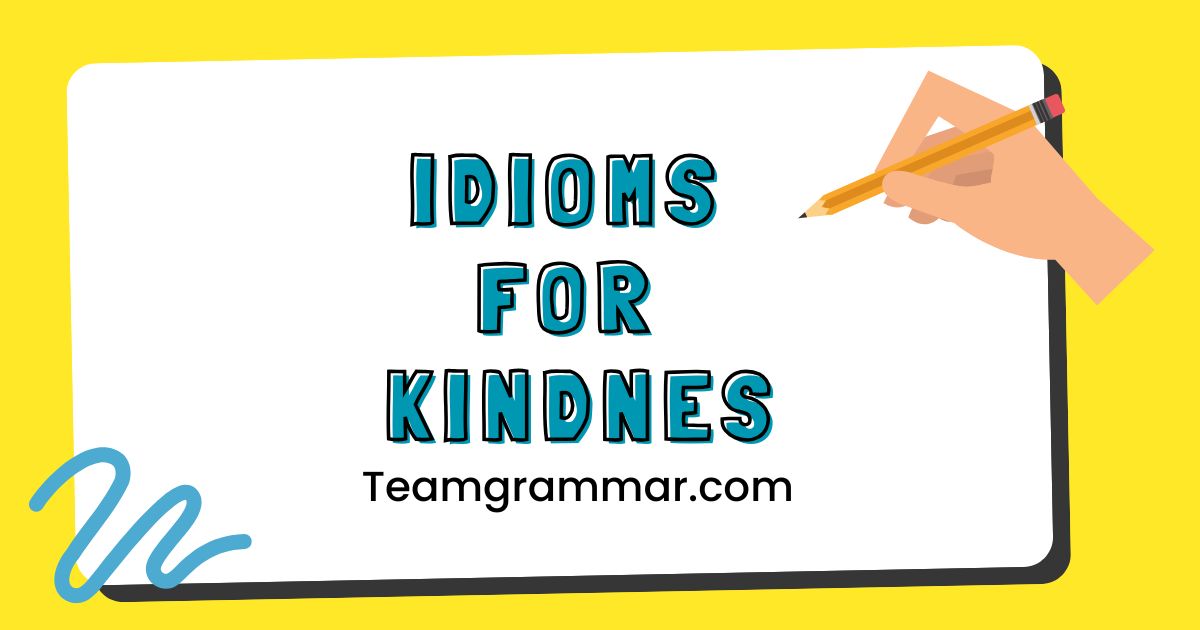30 Idioms for Kindness: Mastering Expressions of Goodwill
Kindness, a cornerstone of human interaction, is often expressed through colorful and nuanced language. Idioms offer a rich tapestry of expressions that go beyond literal meanings to convey acts of goodwill, compassion, and generosity.
Understanding these idioms not only enhances your comprehension of English but also allows you to express yourself more vividly and appropriately in various social contexts. This article delves into the world of idioms related to kindness, exploring their meanings, structures, and usage, providing you with the tools to effectively incorporate them into your everyday communication.
Whether you’re an English language learner or a native speaker seeking to refine your vocabulary, this guide will illuminate the art of expressing kindness through idiomatic language.
Table of Contents
- Introduction
- Definition of Idioms for Kindness
- Structural Breakdown of Idioms
- Types and Categories of Kindness Idioms
- Examples of Idioms for Kindness
- Usage Rules for Kindness Idioms
- Common Mistakes with Kindness Idioms
- Practice Exercises
- Advanced Topics: Nuances and Regional Variations
- Frequently Asked Questions (FAQ)
- Conclusion
Introduction
Idioms enrich the English language, adding depth and color to everyday conversations. When it comes to expressing kindness, idioms provide a particularly vivid and nuanced way to convey goodwill, generosity, and compassion.
These expressions often carry cultural significance and understanding them can significantly enhance your ability to communicate effectively and empathetically. This article explores the fascinating world of idioms related to kindness, providing detailed explanations, examples, and practical exercises to help you master their usage.
This guide is designed for English language learners, educators, and anyone interested in expanding their vocabulary and improving their communication skills.
Definition of Idioms for Kindness
Idioms for kindnessare phrases or expressions where the overall meaning cannot be deduced from the literal definitions of the individual words. Instead, these idioms convey a specific concept or sentiment related to acts of goodwill, compassion, generosity, or empathy.
They are often rooted in cultural contexts and offer a more colorful and engaging way to express kindness than straightforward language.
These idioms function as a form of figurative language, adding depth and nuance to conversations. They can be used to describe actions, attitudes, or characteristics associated with kindness.
Understanding idioms for kindness is crucial for interpreting spoken and written English accurately, as well as for expressing yourself effectively and appropriately.
Idioms related to kindness frequently appear in everyday conversations, literature, and media. They provide a shorthand for expressing complex emotions and intentions, making communication more efficient and engaging.
By mastering these idioms, you can significantly enhance your comprehension and fluency in English.
Structural Breakdown of Idioms
Idioms, by their nature, defy strict grammatical rules. Their structure is often fixed, meaning the words cannot be changed or rearranged without altering the meaning or rendering the idiom nonsensical.
However, understanding the general structural patterns can be helpful.
Many idioms for kindness follow common structural patterns, such as:
- Verb + Preposition: Go the extra mile (to make an effort beyond what is expected).
- Verb + Noun: Offer a helping hand (to provide assistance).
- Adjective + Noun: A heart of gold (to be exceptionally kind and generous).
- Phrases with ‘kind’: A kind soul (a person who is gentle and caring).
The meaning of an idiom is not derived from the individual words but from the phrase as a whole. Therefore, it’s essential to learn idioms as complete units rather than trying to analyze their components literally.
The grammatical function of an idiom can vary depending on its structure and context. Some idioms function as verbs (e.g., lend an ear), while others function as adjectives (e.g., warm-hearted) or nouns (e.g., good Samaritan).
Types and Categories of Kindness Idioms
Idioms for kindness can be categorized based on the specific aspect of kindness they represent. Here are some common categories:
General Acts of Kindness
These idioms describe acts of kindness without specifying a particular type of generosity or compassion. They represent a broad range of benevolent actions.
Generosity and Giving
These idioms focus on acts of giving, sharing, and being generous with resources, time, or possessions.
Compassion and Empathy
These idioms highlight the ability to understand and share the feelings of others, showing empathy and concern for their well-being.
Support and Helpfulness
These idioms describe acts of providing assistance, encouragement, and support to others in need.
Forgiveness and Understanding
These idioms focus on the ability to forgive others, show understanding, and offer a second chance.
Examples of Idioms for Kindness
This section provides a comprehensive list of idioms related to kindness, organized by category, with examples to illustrate their usage.
General Acts of Kindness
The following table provides examples of idioms that describe general acts of kindness, representing a broad range of benevolent actions.
| Idiom | Meaning | Example Sentence |
|---|---|---|
| Have a heart of gold | To be exceptionally kind and generous. | She has a heart of gold and is always helping those in need. |
| Go the extra mile | To make an effort beyond what is expected. | He always goes the extra mile for his colleagues, even when he’s busy. |
| A kind soul | A person who is gentle and caring. | She’s such a kind soul, always looking out for others. |
| Do someone a good turn | To do something helpful or kind for someone. | He did me a good turn by helping me move my furniture. |
| Be a good Samaritan | To be a helpful and compassionate person, especially to strangers. | He was a good Samaritan when he stopped to help the stranded motorist. |
| Offer a helping hand | To provide assistance or support. | She always offers a helping hand to anyone who needs it. |
| Angel on earth | Someone who is incredibly kind and helpful. | The nurse was an angel on earth, providing comfort and care. |
| Give the shirt off your back | To be extremely generous and willing to give everything you have. | He’d give the shirt off his back to help someone in need. |
| Be a ray of sunshine | To bring happiness and positivity to others. | Her smile is like a ray of sunshine, brightening everyone’s day. |
| Have a soft spot for someone | To feel affection or tenderness towards someone. | He has a soft spot for stray animals and always takes them in. |
| As good as gold | Well-behaved and kind. | The children were as good as gold during the church service. |
| A heart of oak | A strong and brave heart, but can also imply kindness. | Despite her tough exterior, she has a heart of oak and always stands up for what’s right. |
| A gentle giant | Someone who is physically large but gentle and kind in nature. | He may look intimidating, but he’s really a gentle giant. |
| Go out of your way | To make a special effort to do something for someone. | She went out of her way to make sure I was comfortable. |
| Put others first | To prioritize the needs and well-being of others. | He always puts others first, even when it’s inconvenient for him. |
| Be there for someone | To be available and supportive when someone needs you. | I know I can always be there for my friends and family. |
| Be a shoulder to cry on | To provide comfort and support to someone who is upset. | She’s always a shoulder to cry on when I’m feeling down. |
| Brighten someone’s day | To make someone feel happier or more cheerful. | A simple compliment can brighten someone’s day. |
| Make someone’s day | To do something that makes someone very happy. | The surprise gift really made my day. |
| Warm the cockles of your heart | To make you feel happy and content. | Seeing the children play together warmed the cockles of my heart. |
| Give someone the time of day | To be polite and friendly to someone, even if you are busy. | Even though he’s the CEO, he always gives everyone the time of day. |
| A good egg | A kind and reliable person. | He’s a good egg, always willing to help out. |
| Paint a smile on someone’s face | To make someone happy. | The surprise visit painted a smile on her face. |
Generosity and Giving
The following table contains idioms related to generosity and giving, highlighting acts of sharing and benevolence.
| Idiom | Meaning | Example Sentence |
|---|---|---|
| Open-handed | Generous and willing to give. | She is always open-handed with her time and resources. |
| Generous to a fault | Extremely generous, sometimes to the point of being unwise. | He’s generous to a fault, often giving away more than he can afford. |
| Give freely | To give without expecting anything in return. | She gives freely of her time to volunteer at the local shelter. |
| Share and share alike | To divide things equally among everyone. | We always share and share alike when we go camping. |
| Be big-hearted | To be generous and compassionate. | He’s such a big-hearted person, always thinking of others. |
| Shell out | To spend money, often reluctantly. | He had to shell out a lot of money to repair his car. |
| Dip into your pocket | To spend your own money, especially to help someone else. | He had to dip into his pocket to help his friend pay the rent. |
| Foot the bill | To pay for something. | His parents footed the bill for his college education. |
| Fork out | To spend money, especially when you don’t want to. | I had to fork out a lot of money for the concert tickets. |
| Hand out | To distribute something to a group of people. | She handed out flyers to promote the event. |
| Chip in | To contribute money to a common fund. | Everyone chipped in to buy a gift for the retiree. |
| Lend a hand | To help someone. | Can you lend a hand with these boxes? |
| Be charitable | To be generous and giving, especially to those in need. | It’s important to be charitable during the holiday season. |
| Give back to the community | To contribute to the well-being of your community. | He believes in giving back to the community through volunteer work. |
| Share the wealth | To distribute resources or benefits more equitably. | The company decided to share the wealth with its employees through bonuses. |
| Spread the love | To share kindness, generosity, and affection. | Let’s spread the love this holiday season by helping those in need. |
| Be a benefactor | To be a person who gives money or other help to a cause or person. | The university honored her as a major benefactor. |
| Be a patron | To be a person who gives financial or other support to a person, organization, cause, or activity. | He was a patron of the arts, supporting many local artists. |
| Donate generously | To give a significant amount of money or resources. | They donate generously to various charities every year. |
| Be philanthropic | To be characterized by a love of humankind. | His philanthropic endeavors have helped countless people. |
| Pay it forward | To respond to a person’s kindness to oneself by being kind to someone else. | After receiving help, she decided to pay it forward by volunteering. |
| Be unstinting | To be given or giving without restraint; unsparing. | She was unstinting in her praise of his achievements. |
| Hand over fist | To spend or give money rapidly and in large amounts. | He was making money hand over fist and donating a lot of it to charity. |
Compassion and Empathy
This table presents idioms related to compassion and empathy, emphasizing understanding and sharing the feelings of others.
| Idiom | Meaning | Example Sentence |
|---|---|---|
| Feel someone’s pain | To understand and empathize with someone’s suffering. | I truly feel your pain after hearing about your loss. |
| Put yourself in someone’s shoes | To imagine what it would be like to be in someone else’s situation. | Try to put yourself in her shoes before you judge her actions. |
| Have a heart | To show compassion and understanding. | Have a heart and give him another chance. |
| Be moved to tears | To be so touched by something that you start crying. | She was moved to tears by the heartfelt speech. |
| Reach out to someone | To offer help or support to someone in need. | It’s important to reach out to those who are struggling. |
| Lend an ear | To listen attentively and sympathetically. | I’m here to lend an ear if you need to talk. |
| Be there in spirit | To offer emotional support even when physically absent. | I can’t be there in person, but I’ll be there in spirit. |
| A sympathetic ear | Someone who listens with understanding and compassion. | She always provides a sympathetic ear when I need to vent. |
| Show empathy | To understand and share the feelings of another. | It’s important to show empathy towards those who are suffering. |
| Take to heart | To be deeply affected by something. | She took his criticism to heart and worked hard to improve. |
| Wear your heart on your sleeve | To openly display your emotions. | She wears her heart on her sleeve, so everyone knows how she’s feeling. |
| Soft-hearted | Kind and compassionate. | He’s a soft-hearted person who can’t stand to see anyone suffer. |
| A tender heart | A heart that is easily moved by emotion. | She has a tender heart and is easily touched by stories of kindness. |
| Have a big heart | To be very kind and generous. | He has a big heart and is always willing to help others. |
| Be of service | To be helpful and useful to others. | She believes in being of service to her community. |
| Comfort the afflicted | To provide comfort and support to those who are suffering. | It’s important to comfort the afflicted during times of crisis. |
| Be a beacon of hope | To provide hope and guidance to others. | She was a beacon of hope for the refugees. |
| Extend a hand | To offer help or support. | We should always extend a hand to those in need. |
| A kindred spirit | Someone who shares your feelings, interests, or attitudes. | We quickly realized we were kindred spirits. |
| Break bread with someone | To share a meal with someone, symbolizing friendship and unity. | They broke bread together to celebrate their newfound friendship. |
| Meet someone halfway | To compromise with someone to reach an agreement. | They decided to meet each other halfway to resolve the conflict. |
| Walk a mile in someone’s shoes | To understand someone’s perspective by imagining yourself in their situation. | Before judging, try to walk a mile in her shoes. |
Support and Helpfulness
The following table shows idioms that describe acts of providing assistance, encouragement, and support to others.
| Idiom | Meaning | Example Sentence |
|---|---|---|
| Be a pillar of strength | To provide unwavering support and stability. | She was a pillar of strength for her family during the crisis. |
| Stand by someone | To support someone, especially during difficult times. | I will always stand by my friends, no matter what. |
| Back someone up | To support someone, especially by providing assistance or evidence. | My colleagues always back me up in meetings. |
| Be in someone’s corner | To support and defend someone. | I’m always in your corner, cheering you on. |
| Go to bat for someone | To support or defend someone strongly. | He went to bat for me when I was unfairly accused. |
| Give someone a leg up | To help someone improve their situation. | The scholarship gave her a leg up in her career. |
| Be a crutch | To provide support, but sometimes to an excessive degree. | I don’t want to be a crutch for you; I want you to be independent. |
| Hold someone’s hand | To provide support and guidance. | I had to hold his hand through the difficult process. |
| Prop someone up | To support someone physically or emotionally. | Her family propped her up during her illness. |
| Come to the rescue | To save someone from a difficult situation. | He came to the rescue when I ran out of gas. |
| Be a life saver | Someone who helps you out of a difficult situation. | You’re a life saver for helping me with this project. |
| Be supportive | To provide encouragement and emotional help. | It’s important to be supportive of your friends’ goals. |
| Offer encouragement | To give someone hope and confidence. | He always offers encouragement to his team members. |
| Give moral support | To provide emotional and psychological support. | I’m here to give you moral support during this difficult time. |
| Be a guiding light | To provide direction and inspiration. | She was a guiding light for many young entrepreneurs. |
| Nurture and care | To provide loving care and support. | Parents nurture and care for their children. |
| Be a mentor | To provide guidance and advice to someone less experienced. | He served as a mentor to many young professionals. |
| Take under your wing | To protect and guide someone. | She took the new employee under her wing. |
| Be a sounding board | Someone you can talk to and get advice from. | He’s always a sounding board for my ideas. |
| Be a shoulder to lean on | To provide emotional support and comfort. | She’s always a shoulder to lean on when I’m feeling stressed. |
| Be there through thick and thin | To support someone during both good and bad times. | They’ve been friends through thick and thin. |
| Go the distance | To persevere and complete a task despite difficulties. | He’s willing to go the distance to achieve his goals. |
| Help someone weather the storm | To help someone get through a difficult period. | Friends and family helped her weather the storm after her divorce. |
Forgiveness and Understanding
This table presents idioms that focus on the ability to forgive others, show understanding, and offer a second chance.
| Idiom | Meaning | Example Sentence |
|---|---|---|
| Turn the other cheek | To respond to an injury without retaliating. | He decided to turn the other cheek and forgive his attacker. |
| Let bygones be bygones | To forget past offenses and move on. | Let’s let bygones be bygones and start fresh. |
| Bury the hatchet | To make peace and end a conflict. | They decided to bury the hatchet and work together. |
| Forgive and forget | To completely forgive someone and put the past behind you. | I hope we can forgive and forget and move forward. |
| Give someone the benefit of the doubt | To believe someone is telling the truth even if you have doubts. | I’ll give him the benefit of the doubt and trust his explanation. |
| Overlook someone’s faults | To ignore someone’s mistakes or weaknesses. | She learned to overlook his faults and focus on his good qualities. |
| Wipe the slate clean | To make a fresh start and forget past mistakes. | Let’s wipe the slate clean and start over. |
| Give a second chance | To allow someone to try again after a failure. | He deserved a second chance after admitting his mistake. |
| Turn a blind eye | To ignore something that you know is wrong. | The manager decided to turn a blind eye to the employee’s misconduct. |
| Let it slide | To ignore a mistake or offense. | I decided to let it slide because it was a minor issue. |
| Be lenient | To be tolerant and forgiving. | The teacher decided to be lenient with the student who was late. |
| Show mercy | To show compassion and forgiveness. | The judge decided to show mercy and gave a lighter sentence. |
| Be understanding | To show empathy and compassion. | It’s important to be understanding of people’s struggles. |
| Have patience | To be tolerant and understanding, especially in difficult situations. | You need to have patience when dealing with children. |
| Give leeway | To allow someone some freedom to act or decide a matter. | The boss gave his employees leeway in completing the project. |
| Be forgiving | To be willing to pardon others for their mistakes. | It’s important to be forgiving in personal relationships. |
| Pardon someone | To forgive someone for an offense. | The governor decided to pardon the convicted criminal. |
| Absolve someone | To free someone from guilt or blame. | The investigation absolved him of any wrongdoing. |
| Water under the bridge | Something that happened in the past and is no longer important. | “That’s water under the bridge,” she said, dismissing the argument. |
| Drop the matter | To stop pursuing a discussion or argument. | Let’s just drop the matter and move on. |
| Turn a new leaf | To start behaving in a better way. | He decided to turn a new leaf after his arrest. |
| Make amends | To do something to correct a mistake or wrong. | He tried to make amends for his past behavior. |
Usage Rules for Kindness Idioms
Using idioms correctly requires understanding their specific meanings and contexts. Here are some key rules to follow:
- Use idioms in appropriate contexts: Consider the audience and the situation. Idioms are generally more suitable for informal settings than formal ones.
- Avoid overusing idioms: While idioms can add color to your language, using too many can make your speech sound unnatural or forced.
- Be aware of cultural differences: Some idioms may not be universally understood or may have different connotations in different cultures.
- Understand the nuances of meaning: Pay attention to the subtle differences between similar idioms to ensure you’re using the most appropriate one.
It’s also important to remember that idioms are generally fixed expressions. Avoid changing the words or grammatical structure, as this can alter the meaning or make the idiom nonsensical.
Always consider the tone and formality of your communication when deciding whether to use an idiom. In formal writing or presentations, it’s often best to use more direct and literal language.
Common Mistakes with Kindness Idioms
Even experienced English speakers sometimes make mistakes when using idioms. Here are some common errors to avoid:
- Literal interpretation: Interpreting idioms literally instead of understanding their figurative meaning.
- Incorrect word choice: Substituting words within an idiom, which can change the meaning or make it nonsensical.
- Misunderstanding the context: Using an idiom in an inappropriate situation or with the wrong audience.
- Overusing idioms: Cluttering your speech with too many idioms, making it sound unnatural.
Here are some examples of correct vs. incorrect usage:
| Incorrect | Correct | Explanation |
|---|---|---|
| She has a gold heart. | She has a heart of gold. | The correct idiom is “heart of gold,” not “gold heart.” |
| He went the more mile. | He went the extra mile. | The correct idiom is “extra mile,” not “more mile.” |
| Offer a helping hand for him. | Offer him a helping hand. | The correct structure is “offer someone a helping hand.” |
Practice Exercises
Test your knowledge of idioms for kindness with these practice exercises.
Exercise 1: Fill in the Blanks
Fill in the blanks with the appropriate idiom from the list below:
(a heart of gold, go the extra mile, a kind soul, do someone a good turn, lend an ear)
| Question | Answer |
|---|---|
| 1. She is always willing to _________ to help her friends with their problems. | lend an ear |
| 2. He is _________ and always helps those in need. | a kind soul |
| 3. She _________ by volunteering at the homeless shelter every weekend. | does someone a good turn |
| 4. He has _________ and is always thinking of others. | a heart of gold |
| 5. She will _________ to make sure everyone is comfortable and happy. | go the extra mile |
Exercise 2: Multiple Choice
Choose the best idiom to complete the sentence.
| Question | Options | Answer |
|---|---|---|
| 1. He always _________ for his colleagues, even when he’s busy. | a) goes the extra kilometer b) goes the extra mile c) goes the extra inch | b) goes the extra mile |
| 2. She is such _________, always looking out for others. | a) a kind heart b) a kind person c) a kind soul | c) a kind soul |
| 3. He _________ by helping me move my furniture. | a) did me a good thing b) did me a good turn c) did me a good deed | b) did me a good turn |
| 4. She is an _________, providing
providing comfort and care. |
a) earth angel b) angel on world c) angel on earth | c) angel on earth |
| 5. He’d _________ to help someone in need. | a) give the shirt from his back b) give the shirt off his back c) give the coat off his back | b) give the shirt off his back |
Exercise 3: Matching
Match the idiom with its correct meaning.
| Idiom | Meaning |
|---|---|
| 1. Have a heart of gold | a) To provide assistance or support |
| 2. Offer a helping hand | b) To be exceptionally kind and generous |
| 3. Go the extra mile | c) To do something helpful or kind for someone |
| 4. Do someone a good turn | d) To make an effort beyond what is expected |
Answers:
- 1 – b
- 2 – a
- 3 – d
- 4 – c
Advanced Topics: Nuances and Regional Variations
The subtleties and regional differences in idioms for kindness provide a fascinating field for advanced study. Different cultures and regions may have unique expressions that convey similar sentiments, but with distinct nuances rooted in their specific histories and values.
For example, while the idiom “have a heart of gold” is widely understood in English-speaking countries, other cultures may use different metaphors to express the same idea. Exploring these variations can enhance your cross-cultural communication skills and deepen your understanding of diverse perspectives on kindness.
Additionally, the historical context of an idiom can influence its present-day usage. Some idioms may have originated in specific historical events or social customs, and understanding these origins can provide valuable insights into their meanings and connotations.
Studying regional variations and historical contexts of idioms for kindness can also help you avoid cultural misunderstandings and communicate more effectively in diverse settings. This advanced knowledge can be particularly valuable for professionals working in international environments or for anyone interested in cross-cultural communication.
Frequently Asked Questions (FAQ)
Conclusion
Mastering idioms for kindness is an invaluable asset in enhancing your communication skills and deepening your understanding of the English language. These expressions of goodwill, compassion, and generosity add color and nuance to your conversations, allowing you to express yourself more vividly and appropriately in various social contexts.
By understanding the definitions, structures, and usage rules of these idioms, you can effectively incorporate them into your everyday communication.
Throughout this article, we have explored various categories of kindness idioms, from general acts of kindness to generosity, compassion, support, and forgiveness. The examples and practice exercises provided offer practical opportunities to reinforce your learning and improve your fluency.
Additionally, the discussion of advanced topics such as regional variations and cultural nuances encourages a deeper exploration of the rich tapestry of idiomatic language.
As you continue your journey in mastering English, remember that language is not just about conveying information but also about building connections and expressing emotions. By embracing the power of idioms for kindness, you can communicate with greater empathy, understanding, and impact, enriching your interactions and fostering meaningful relationships.







